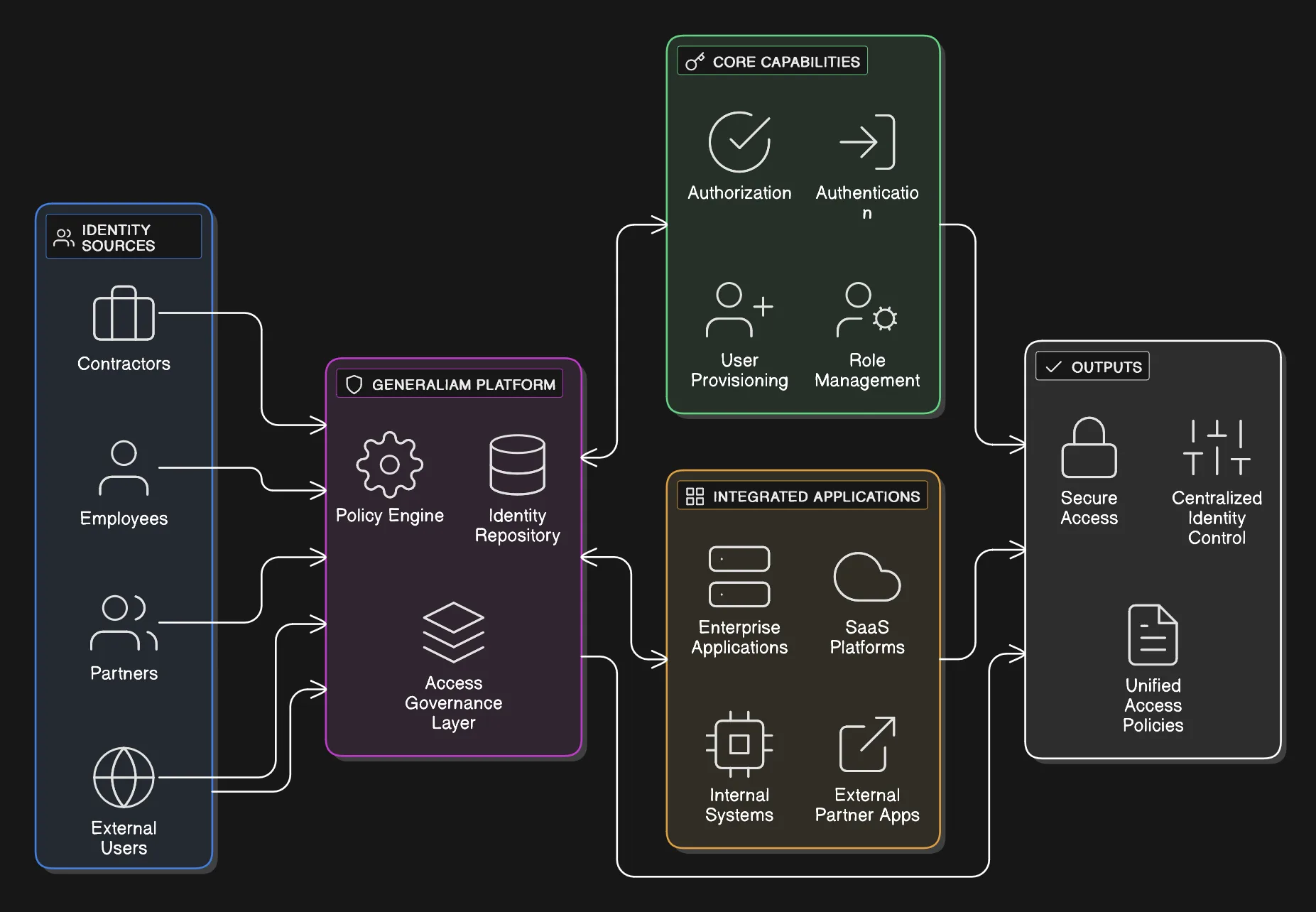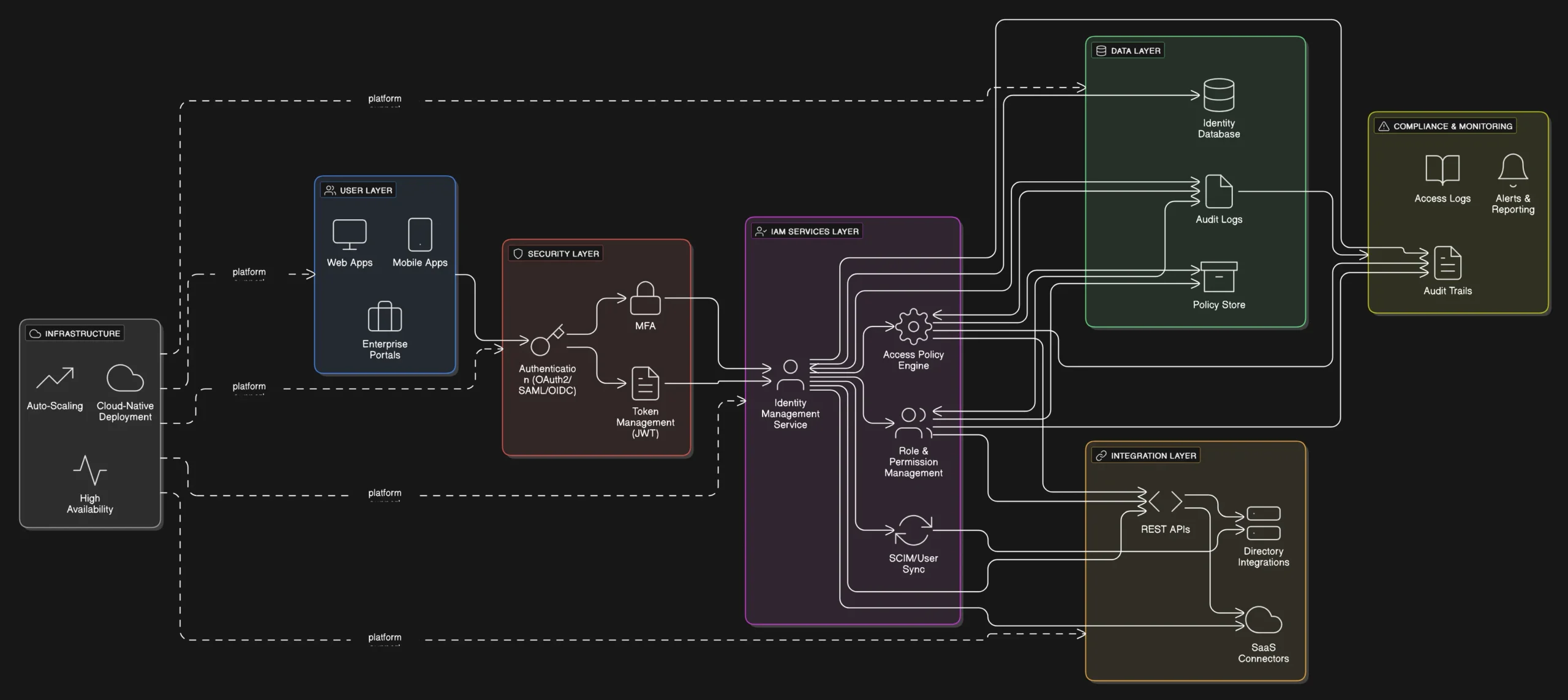Enterprise IAM Solution for a Global Organization
Project Snapshot
Industry
Enterprise Security,IAM, Compliance
Solution Type
Full IAM Platform
Service Categories
Tech Stack
Java, Spring Boot, OAuth2, SAML, SCIM, Microservices, AWS
Scale
500k+ Users, 25+ Applications
Duration
6 Months
Status
Live & Scaled Globally
About the Enterprise IAM Solution
The client, a global organization with distributed teams and complex access workflows, needed a centralized identity platform. Their legacy system lacked automated provisioning, granular access control, and integration capabilities.
Inexture designed GeneralIAM, a full-featured IAM solution supporting modern authentication, role management, application onboarding, identity lifecycle automation, and secure user provisioning via SCIM and APIs.
Client Requirements
- Centralize identity management across departments
- Support both B2B and internal user authentication
- Implement OAuth2, SAML, and SCIM protocols
- Automate user lifecycle: provisioning, deprovisioning, access change
- Provide role-based access controls (RBAC)
- Build an intuitive admin console
- Ensure audit readiness and compliance
- Enable easy integration with legacy apps and third-party SaaS systems
Challenges We Solved
- Highly fragmented authentication systems across apps
- No centralized policy enforcement or audit trail
- Manual access management causing security risks
- Inconsistent permission models across departments
- Required zero-downtime migration
- Needed multilingual and multi-region support
Enterprise IAM - System Overview

Our Solution & Architecture
Inexture delivered a modern, secure IAM platform with microservices and industry-standard authentication protocols, enabling seamless onboarding and identity governance.
- Central Authentication Service with JWT/OAuth2
- SSO implementation across enterprise applications
- SCIM 2.0 provisioning for automated user lifecycle
- Admin Console for roles, permissions & user management
- SAML-based federation to integrate with third-party systems
- Multi-tenant and multi-role architecture
- Robust audit logs with compliance-ready reporting
- Zero-downtime migration from legacy IAM
Enterprise IAM - Identity & Governance Architecture
A governance-focused architecture showing identity stores, access policies, role management, and application integrations for centralized enterprise access control.

Technology Stack
A robust and scalable technology foundation powering seamless performance and future-ready growth
- React.js
- Material UI
- Java
- Microservices Architecture
- Spring Boot
- REST APIs
- OAuth2
- SAML
- SCIM 2.0
- JWT
- PostgreSQL
- AWS (EC2, EKS, CloudWatch)
- Redis Cache
Measurable Outcomes
- Centralized IAM for 500k+ users across 25 apps
- 60% reduction in onboarding time with SCIM automation
- 99.99% uptime on AWS microservices architecture
- Full audit visibility via monitoring dashboards
- Role-based governance removed unauthorized access incidents
- Multi-region support with minimal latency
Industries We Serve
Relevant Enterprise Solutions
Identity & Access Management (IAM) Solutions
Identity & Access Management (IAM) Solutions for Modern Enterprises Secure, scalable IAM platforms powered by SCIM, OAuth2, SAML, MFA, RBAC/ABAC,...
API Platforms & Integration Ecosystems
API Platforms & Integration Ecosystems Build secure, enterprise-grade APIs and integration ecosystems that connect your systems, automate data flows, and...
Cloud Modernization & Application Re-Engineering Solutions
Cloud Modernization Services & Application Re-Engineering Solutions We modernize legacy enterprise applications, migrate workloads to the cloud, re-engineer monolithic systems...
Related Portfolio
Related Case Studies
SCIM Identity Management Integration
A scalable enterprise IAM solution built with SCIM 2.0, OAuth2, and Spring Boot to automate user provisioning, centralize access governance,...
Related Blogs
Digital Transformation & Architecture
Custom Software Development for Enterprise Business — Architecture, Cost & Implementation Guide (2025)
Dharmesh Patel
February 1, 2024





